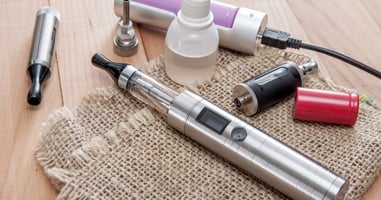Today, the American Heart Association (AHA) issued a new policy statement on the use and control of...
FDA Proposes New Rule to Control E-Cigarettes, Other Tobacco Products
 |
“E-cigarettes” vaporize liquid nicotine for inhalation. They are controversial because they are seen by some as devices that only perpetuate nicotine addiction and by others as a useful way to wean smokers off ordinary cigarettes, much like nicotine patches or gum. E-cigarettes are also a public health concern for individuals with severe mental illness because of their high rate of nicotine use.
Besides the addictive potential of e-cigarettes, the liquid nicotine used by e-cigarettes can be toxic when ingested or absorbed through the skin. Poison control officials have raised concerns about that danger, especially for young children who pick up bottles of the liquid that adults use for refilling the e-cigarettes.
The FDA already regulates cigarettes and cigarette tobacco, as well as snuff and chewing tobacco. Along with e-cigarettes, the agency seeks to add cigars, pipe tobacco, nicotine gels, and hookah tobacco to its purview. The proposal would add age restrictions to sales of such products, add health warnings, and prohibit sales from vending machines accessible to young people.
The proposed rule, said FDA Commissioner Margaret Hamburg, M.D., in a statement, “would also help to correct a misperception by consumers that tobacco products not regulated by FDA are safe alternatives to currently regulated tobacco products.”
The FDA has opened a 75-day period for anyone who wishes to comment on the proposal.
For more in Psychiatric News about e-cigarettes, see "Electronic Cigarettes May Be Gateway to Tobacco Smoking."
(Image: Librakv/Shutterstock.com)





